状语从句的省略形式
- 格式:doc
- 大小:245.00 KB
- 文档页数:21
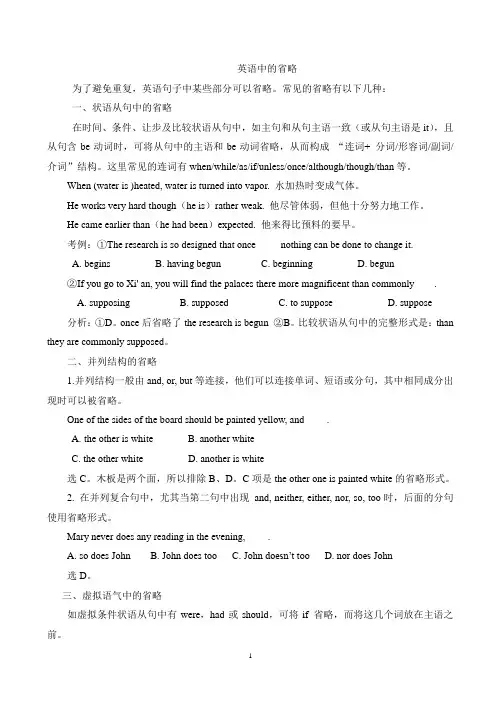
英语中的省略为了避免重复,英语句子中某些部分可以省略。
常见的省略有以下几种:一、状语从句中的省略在时间、条件、让步及比较状语从句中,如主句和从句主语一致(或从句主语是it),且从句含be动词时,可将从句中的主语和be动词省略,从而构成“连词+ 分词/形容词/副词/介词”结构。
这里常见的连词有when/while/as/if/unless/once/although/though/than等。
When (water is )heated, water is turned into vapor. 水加热时变成气体。
He works very hard though(he is)rather weak. 他尽管体弱,但他十分努力地工作。
He came earlier than(he had been)expected. 他来得比预料的要早。
考例:①The research is so designed that once ____ nothing can be done to change it.A. beginsB. having begunC. beginningD. begun②If you go to Xi' an, you will find the palaces there more magnificent than commonly ___ .A. supposingB. supposedC. to supposeD. suppose分析:①D。
once后省略了the research is begun ②B。
比较状语从句中的完整形式是:than they are commonly supposed。
二、并列结构的省略1.并列结构一般由and, or, but等连接,他们可以连接单词、短语或分句,其中相同成分出现时可以被省略。
One of the sides of the board should be painted yellow, and ____.A.the other is whiteB. another whiteC. the other whiteD. another is white选C。
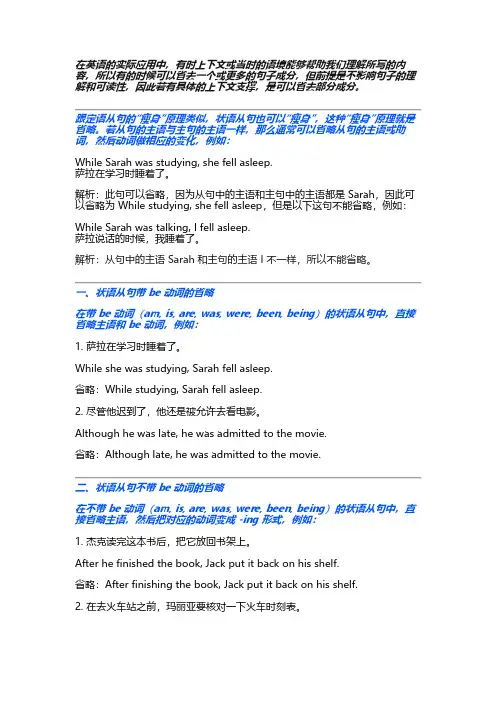
在英语的实际应用中,有时上下文或当时的语境能够帮助我们理解所写的内容,所以有的时候可以省去一个或更多的句子成分,但前提是不影响句子的理解和可读性,因此若有具体的上下文支撑,是可以省去部分成分。
跟定语从句的“瘦身”原理类似,状语从句也可以“瘦身”,这种“瘦身”原理就是省略。
若从句的主语与主句的主语一样,那么通常可以省略从句的主语或助词,然后动词做相应的变化,例如:While Sarah was studying, she fell asleep.萨拉在学习时睡着了。
解析:此句可以省略,因为从句中的主语和主句中的主语都是 Sarah,因此可以省略为 While studying, she fell asleep,但是以下这句不能省略,例如:While Sarah was talking, I fell asleep.萨拉说话的时候,我睡着了。
解析:从句中的主语 Sarah 和主句的主语 I 不一样,所以不能省略。
一、状语从句带 be 动词的省略在带 be 动词(am, is, are, was, were, been, being)的状语从句中,直接省略主语和 be 动词,例如:1. 萨拉在学习时睡着了。
While she was studying, Sarah fell asleep.省略:While studying, Sarah fell asleep.2. 尽管他迟到了,他还是被允许去看电影。
Although he was late, he was admitted to the movie.省略:Although late, he was admitted to the movie.二、状语从句不带 be 动词的省略在不带 be 动词(am, is, are, was, were, been, being)的状语从句中,直接省略主语,然后把对应的动词变成 -ing 形式,例如:1. 杰克读完这本书后,把它放回书架上。
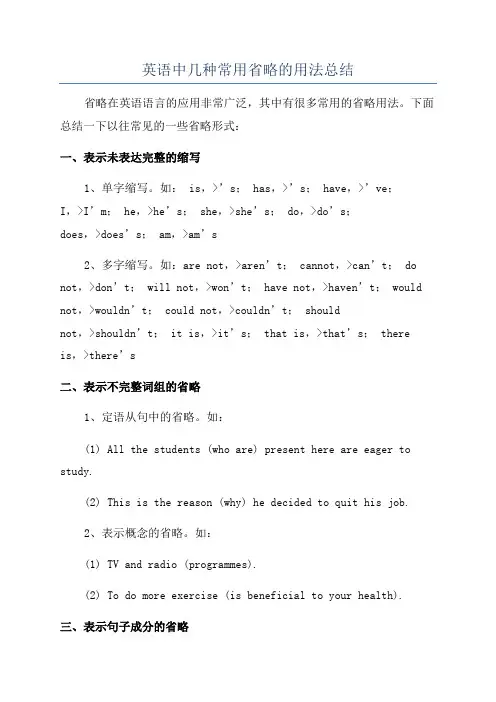
英语中几种常用省略的用法总结省略在英语语言的应用非常广泛,其中有很多常用的省略用法。
下面总结一下以往常见的一些省略形式:一、表示未表达完整的缩写1、单字缩写。
如: is,>’s; has,>’s; have,>’ve;I,>I’m; he,>he’s; she,>she’s; do,>do’s;does,>does’s; am,>am’s2、多字缩写。
如:are not,>aren’t; cannot,>can’t; do not,>don’t; will not,>won’t; have not,>haven’t; would not,>wouldn’t; could not,>couldn’t; shouldnot,>shouldn’t; it is,>it’s; that is,>that’s; there is,>there’s二、表示不完整词组的省略1、定语从句中的省略。
如:(1) All the students (who are) present here are eager to study.(2) This is the reason (why) he decided to quit his job.2、表示概念的省略。
如:(1) TV and radio (programmes).(2) To do more exercise (is beneficial to your health).三、表示句子成分的省略1、宾语的省略。
如:(1) I like to read (books).(2) He gave me an answer (to my question).2、表语的省略。
如:(1) He is a teacher (of English).(2) The weather today is (very) hot.3、主语的省略。
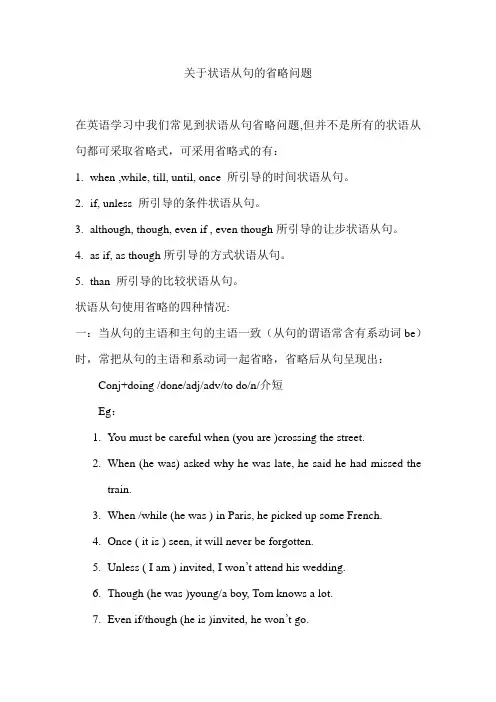
关于状语从句的省略问题在英语学习中我们常见到状语从句省略问题,但并不是所有的状语从句都可采取省略式,可采用省略式的有:1.when ,while, till, until, once 所引导的时间状语从句。
2.if, unless 所引导的条件状语从句。
3.although, though, even if , even though所引导的让步状语从句。
4.as if, as though所引导的方式状语从句。
5.than 所引导的比较状语从句。
状语从句使用省略的四种情况:一:当从句的主语和主句的主语一致(从句的谓语常含有系动词be)时,常把从句的主语和系动词一起省略,省略后从句呈现出:Conj+doing /done/adj/adv/to do/n/介短Eg:1.You must be careful when (you are )crossing the street.2.When (he was) asked why he was late, he said he had missed thetrain.3.When /while (he was ) in Paris, he picked up some French.4.Once ( it is ) seen, it will never be forgotten.5.Unless ( I am ) invited, I won’t attend his wedding.6.Though (he was )young/a boy, Tom knows a lot.7.Even if/though (he is )invited, he won’t go.8.He must be somewhere around if (he is )not here/in the office.9.They looked around the room as if /though (they were)looking forsomething.10.H e opened his mouth as if /though (he was) to say something.11.H e is much taller than (he is) expected.12.I can’t do it until (I am) told how to.13.W hen/while (he was) still a boy, he began to support himself.14.I f (water is )heated to a higher temperature, water will be turnedinto steam.15.T he research is so designed that once_____, nothing can be doneto change it.A beginsB having beganC beginningD begun(D)16. The 18—storied building ,when ______, will shut out the sun lighting up the rooms in my house.A completed B. to be completed C. completing D. have completed (A)17. The flowers will die unless ______every day .A wateredB wateringC waterD to water (A)二:当从句的主语和主句的逻辑主语一致时,也可把从句省略为Conj+doing /done/adj/adv/to do/n/介短,此种用法主要是用来描述或说明某种现象或情况,是“对事不对人”,而第一种情况是就具体的人或事来说明的。
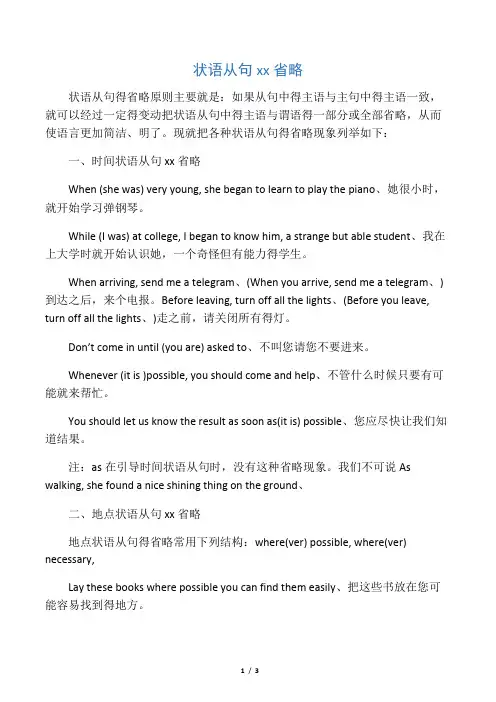
状语从句xx省略状语从句得省略原则主要就是:如果从句中得主语与主句中得主语一致,就可以经过一定得变动把状语从句中得主语与谓语得一部分或全部省略,从而使语言更加简洁、明了。
现就把各种状语从句得省略现象列举如下:一、时间状语从句xx省略When (she was) very young, she began to learn to play the piano、她很小时,就开始学习弹钢琴。
While (I was) at college, I began to know him, a strange but able student、我在上大学时就开始认识她,一个奇怪但有能力得学生。
When arriving, send me a telegram、(When you arrive, send me a telegram、)到达之后,来个电报。
Before leaving, turn off all the lights、(Before you leave, turn off all the lights、)走之前,请关闭所有得灯。
Don’t come in until (you are) asked to、不叫您请您不要进来。
Whenever (it is )possible, you should come and help、不管什么时候只要有可能就来帮忙。
You should let us know the result as soon as(it is) possible、您应尽快让我们知道结果。
注:as在引导时间状语从句时,没有这种省略现象。
我们不可说As walking, she found a nice shining thing on the ground、二、地点状语从句xx省略地点状语从句得省略常用下列结构:where(ver) possible, where(ver) necessary,Lay these books where possible you can find them easily、把这些书放在您可能容易找到得地方。
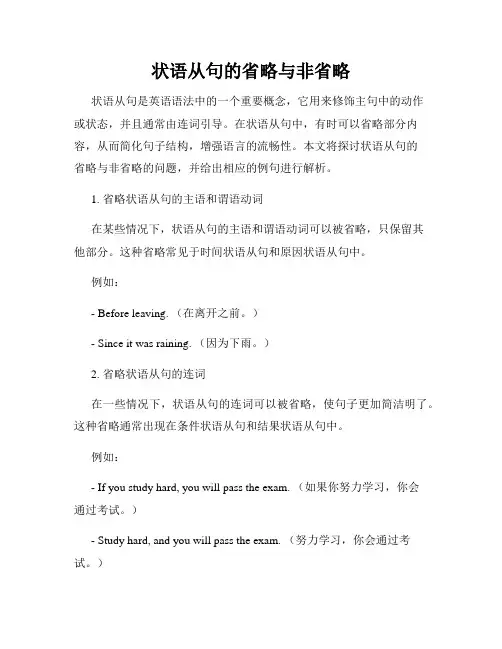
状语从句的省略与非省略状语从句是英语语法中的一个重要概念,它用来修饰主句中的动作或状态,并且通常由连词引导。
在状语从句中,有时可以省略部分内容,从而简化句子结构,增强语言的流畅性。
本文将探讨状语从句的省略与非省略的问题,并给出相应的例句进行解析。
1. 省略状语从句的主语和谓语动词在某些情况下,状语从句的主语和谓语动词可以被省略,只保留其他部分。
这种省略常见于时间状语从句和原因状语从句中。
例如:- Before leaving. (在离开之前。
)- Since it was raining. (因为下雨。
)2. 省略状语从句的连词在一些情况下,状语从句的连词可以被省略,使句子更加简洁明了。
这种省略通常出现在条件状语从句和结果状语从句中。
例如:- If you study hard, you will pass the exam. (如果你努力学习,你会通过考试。
)- Study hard, and you will pass the exam. (努力学习,你会通过考试。
)3. 省略状语从句的主语和连词有时候,状语从句的主语和连词都可以被省略,只保留谓语动词和其他部分。
这种省略常见于让步状语从句和目的状语从句中。
例如:- Although tired, they continued working. (虽然疲劳,他们继续工作。
)- They continued working, tired as they were. (他们继续工作,虽然很疲劳。
)4. 非省略状语从句的形式状语从句也可以选择不进行省略,保留完整的句子结构。
这种形式在强调从句内容或提供更多细节时常常使用。
例如:- Although he was tired, he continued working until midnight. (虽然他很疲劳,他继续工作直到午夜。
)- Since it was raining heavily, we decided to stay at home. (因为下雨很大,我们决定待在家里。

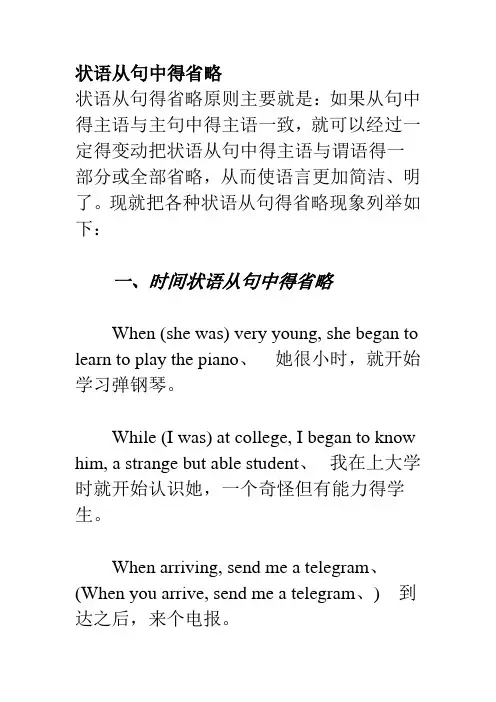
状语从句中得省略状语从句得省略原则主要就是:如果从句中得主语与主句中得主语一致,就可以经过一定得变动把状语从句中得主语与谓语得一部分或全部省略,从而使语言更加简洁、明了。
现就把各种状语从句得省略现象列举如下:一、时间状语从句中得省略When (she was) very young, she began to learn to play the piano、她很小时,就开始学习弹钢琴。
While (I was) at college, I began to know him, a strange but able student、我在上大学时就开始认识她,一个奇怪但有能力得学生。
When arriving, send me a telegram、(When you arrive, send me a telegram、) 到达之后,来个电报。
Before leaving, turn off all the lights、(Before you leave, turn off all the lights、) 走之前,请关闭所有得灯。
Don’t come in until (you are) asked to、不叫您请您不要进来。
Whenever (it is )possible, you should come and help、不管什么时候只要有可能就来帮忙。
You should let us know the result as soon as(it is) possible、您应尽快让我们知道结果。
注:as在引导时间状语从句时,没有这种省略现象。
我们不可说As walking, she found a nice shining thing on the ground、二、地点状语从句中得省略地点状语从句得省略常用下列结构:where(ver) possible, where(ver) necessary,Lay these books where possible you can find them easily、把这些书放在您可能容易找到得地方。
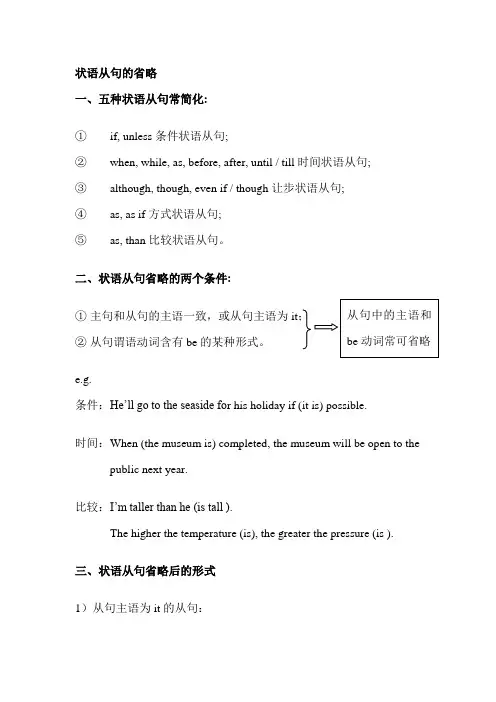
状语从句的省略一、五种状语从句常简化:① if, unless条件状语从句;② when, while, as, before, after, until / till时间状语从句;③ although, though, even if / though让步状语从句;④ as, as if方式状语从句;⑤ as, than比较状语从句。
二、状语从句省略的两个条件:①主句和从句的主语一致,或从句主语为it;②从句谓语动词含有be的某种形式。
e.g.条件:He’ll go to the seaside fo r his holiday if (it is) possible.时间:When (the museum is) completed, the museum will be open to the public next year.比较:I’m taller than he (is tall ).The higher the temperature (is), the greater the pressure (is ).三、状语从句省略后的形式1)从句主语为it的从句:条件:If (it is) possible, he will help you out of the difficulty.让步:You must attend the meeting unless (it is) inconvenient to you. 2)主句和从句的主语一致a.连词+形容词As (he was) young, he learned how to ride a bike.Whenever (she is) free, she often goes shopping.Work hard when (you are) young, or you'll regret.b.连词+名词While (he was) a young boy, he was always ready to help others. Although (he was) a farmer, now he is a famous director.c.连词+现在分词As (she was) walking along the river bank, she was singing a pop song. Although (he is) doing his best in maths these days, he has still got no good marks.d.连词+过去分词He won't go there with us unless (he is) invited.The concert was a great success than (it was) expected.e.连词+不定式He stood up as if (he were) to say something.He wouldn't solve the problem even if (he were) to take charge.f. 连词+介词短语She looked anxious as though (she was) in trouble.He had mastered the English language before (he was) in the USA.注意:当从句主语和主句主语不一致时,从句部分要么用完整的句子,要么用独立主格结构来表达。
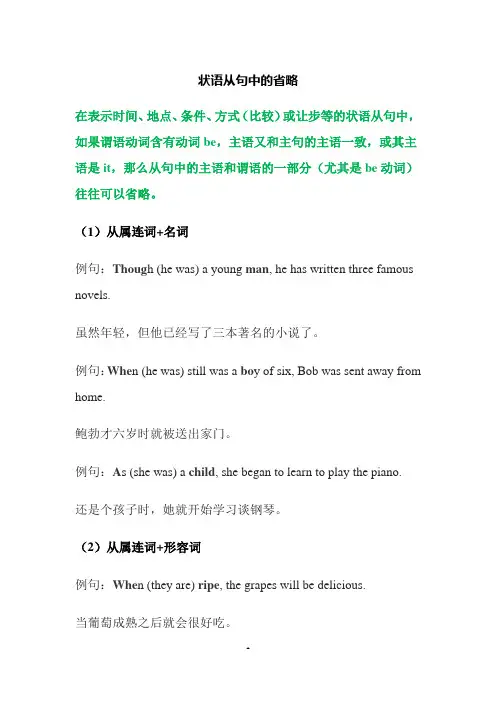
状语从句中的省略在表示时间、地点、条件、方式(比较)或让步等的状语从句中,如果谓语动词含有动词be,主语又和主句的主语一致,或其主语是it,那么从句中的主语和谓语的一部分(尤其是be动词)往往可以省略。
(1)从属连词+名词例句:Thoug h (he was) a young man, he has written three famous novels.虽然年轻,但他已经写了三本著名的小说了。
例句:Whe n (he was) still was a bo y of six, Bob was sent away from home.鲍勃才六岁时就被送出家门。
例句:A s (she was) a child, she began to learn to play the piano.还是个孩子时,她就开始学习谈钢琴。
(2)从属连词+形容词例句:Whe n (they are) ripe, the grapes will be delicious.当葡萄成熟之后就会很好吃。
例句:Thoug h (she was) young, she had to live on himself.虽然年纪轻轻,但她不得不养活自己。
例句:He talked to the stranger as i f (he were) absent-minded. 他和陌生人谈话似乎很不在意。
(3)从属连词+副词例句:Unles s (you are) here, you can't find this kind of butterfly. 除非在这里,其他地方找不到这种蝴蝶。
例句:Whil e (we were) there, we joined in voluntary labour on a project.我们一到那儿,就自愿参加了这项工程。
(4)从属连词+介词短语例句:Whe n (you are) in doubt, please consult a dictionary.有疑问的时候,就请查字典。
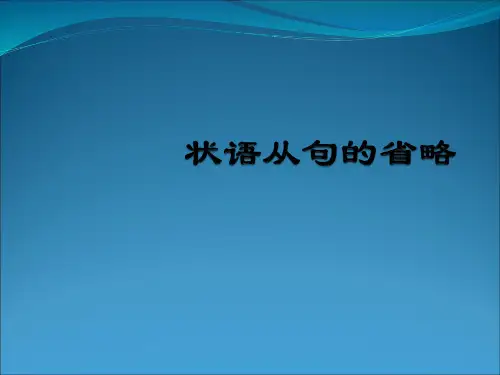
(完整版)状语从句的省略(精讲精练)状语从句的省略一:状语从句中的省略省略句的规则1.当从句的主语和主句的主语一致(或者从句的主语为it).2.从句谓语中包含be动词.如:be doing,be done, be to do, be +adj在此种情况下可以省去从句的主语和be动词.保留be之后的部分,被保留部分常为现在分词、过去分词、不定式、形容词等。
1. Don’t speak until(you are)spoken to .2. I’ll buy a TV set if (it is )necessary.3. While(I was )walking walking alone in the street, I heard my name called.4.Tom raised his hand as if (he was ) to say something.二:常见的几种状语从句的省略1.when,while,as, until引导的时间状语从句的省略while(they are)visiting the city.they reeeived a warm welcomwhen(he was)asked why he was late,he kept silent.●注意After finishing his homework,he went home happily.Before being repaired, the TV set needs a careful examination.2.if,unless,once引导的条件状语从句的省略Onee(it is)begun.it must be done well.Unless(you are invited) to speak, you should remain silent at the conference.Correct mistakes, if any.3.though,although,even if,even though引导的让步状语从句的省略Though lacking money, his parents managed to send him touniversity.4.as though,as if,as引导的方式状语从句的省略He shook his head as if (he was)to say: “Don’t trust her”.She left the room hurriedly as if( she was) angry.He stared at the girl as if (he was) seeing her for the first time.You should finish the homework as (you are)required.5. than引导的比较状语从句的省略They sent us much more materials than required.1._____________________ (在北京的时候), I paid a visit to the Summer Palace.2. ____________________(当是个年轻人的时候), Abraham Lincoln was a storekeeper and a postmaster.3.He has no money_____(要是有的话), he will give us.4._____________(除非修理), the machine is of no use.5. _______________________(要是给更多的关注), The boy could have turned out better.6. A girl stood at the gate of the school as if _________ _____________________(跟老师讲话).7.这次展览比预料的有趣.8..她张开嘴好象要大哭起来.9.除非邀请,否则我不会去参加这次晚会.10.明天早点起来,要是不起来的话,你就赶不上第一班车了.11当我在做作业时,我听到有人喊救命.12.他篮球打得即使没你好,也起码一样好.1.When ________ , the museum will open to the public next year . (complete)2.The flowers his friend gave him will die unless _______every day. (water)3. The boss, not the workers should be responsible for the accident. They just carried out the order as__(tell4. When _______what they needed most, the kids said they wanted to feel important and loved. ( ask)5.One day while ________(work) at the cash register in the gift shop,I saw an elderly couple.6.When_______(finish),the knot looks identical from both the front and back.7.They promise to take action,_____needed, to maintain financial stability in the euro area as a whole.8.The building was still shaking while I_______(walk) along the road.9.Friendship is like money: easier made than _____ .(keep)10.When I was at your age my father told me that I should go and work wherever ____ most. (need)二since,before,after引导的状语从句有时可以变成介词短语或分词短语。
状语从句省略的十大类型请看2004年的一道高考试题It shames me to say it, but I told a lie when _____ at the meeting by my boss.A. questioningB. having questionedC. questionedD. to be questioned 在行文结构上,从属连词as, though, when, while, unless, once 等引导的状语从句常常出现省略。
这些从句中的省略往往不尽相同,很难找到一个统一的规律,同学们应着重注意以下十种情况。
一、as引导的从句的省略【现象】①省略:主语和谓语;主语和动词be。
②保留:状语、分词。
例She plays with it as a cat with a mouse. 她玩得就象猫玩老鼠一样。
【经典试题】There are now three times as many schools in this city _____ ten years ago. A. as it is B. with C. more than D. as二、as if引导的方式状语从句的省略【现象】①省略:主语和系动词;主语和谓语。
②保留:表语、分词或者状语。
例She opened her mouth as if to say something. 她张开嘴好象想说什么。
【经典试题】The man we followed suddenly stopped and looked as if _____ whether he was going in the right direction.A. to seeB. seeingC. seenD. saw三、though/although引导的让步从句的省略【现象】①省略:主语和动词be。
②保留:表语或者分词。
例The hours we were together were long, though seeming short. 我们在一起的时间很长,尽管看上去很短。
状语从句的省略
状语从句的省略有以下几种情况:
一、在状语从句中如果主语与主句的主语一致,同时从句中又含有动词be则通常可省去从句中的主语和动词be,留下其余部分。
1.She stood at the gate as if (she was)waiting for someone. 她站在门口好像在等人。
2. The man , while (he is )over eighty, can walk faster than I .这人虽年过八十,却比我走得快。
3 .Be careful while (you are)crossing the road. 过马路时要当心。
4 .When (it is)heated, ice can turn into water. 冰经过加热能变成水。
二、若状语从句中主语是it,动词是系动词be,则通常可省去主语it及系动词be,留下其余部分。
1. Though (it was) cold,he still wore a shirt.天气虽然冷,他还穿一件衬衫。
2. Come tomorrow if (it is) possible.可能的话就明天来吧。
3. I’ll buy a TV set if (it is) necessary.
如有必要,我就买一台电视机。
三、状语从句中的部分内容若与主句的部分内容相同,可将从句中的此部分内容省去。
1. He has no money.If (he has) any,he will give us.他没有钱,如果有,他会给我们的。
状语从句的三类省略形式一、省略主语和动词be当状语从句的主语与主句主语一致,且从句谓语包括有动词be 时,有时可省略从句中的主语和动词be。
如:Phone me if (it is) necessary. 必要时给我打电话。
Start when (you are) ready. 准备好了就开始。
He danced about as if (he was) in search of something.他向四周望望,仿佛在找什么似的。
Though (he was) intelligent, he was very poorly educat ed. 虽然他很聪明,受的教育却很差。
注:有时省略的可能是 there is, it is 等。
如:There is few if (there is) any. 如果有也很少。
Fill in the application as (it is) instructed. 按照要求填好表格。
As (it is) scheduled they met on January 20. 他们按照计划在1月20日碰头。
二、结果状语从句省略thatso that, so…that, such…that 引导结果状语从句时,有时可省略that。
如:I am so busy (that) I have no time to write a letter. 我是那样忙,写信的时间都没有。
He was so drunk (that) he could barely stand. 他喝醉了,勉强能站立。
The girls are so close (that) they’re like sisters. 女孩们亲如姐妹。
There was such a lot of rain (that) we couldn't go out. 雨那么大,我们没法出去。
She spoke with such sincerity (that) he felt greatly touc hed. 她说得那样诚恳,他深受感动。
状语从句用一个句子(从句)来作另一个句子(主句)的状语,用作状语的句子就叫作状语从句。
作什么样的状语就叫什么类型的状语从句。
例如:条件状语从句就是用一个句子来作条件状语。
状语从句的分类:(1)时间状语从句凡是从句都必须有引导词,引导时间状语从句的词有when,before,after,until,as soon as,while 等。
(2)条件状语从句主要看一下由if引导的条件状语从句。
if 意为“如果”,引导条件状语从句时,表示假如有从句的动作发生就(不)会有主句的动作发生。
例如:If it doesn't rain tomorrow,we will go there by bike.如果明天不下雨,我们就骑自行车去那里。
If I get there early,I can see the doctor quickly.如果我早早地到那里,我就可以快点看病。
3)地点状语从句用法要点常用where(哪里)和wherever(无论哪里)eg.Where there is a will,there is a way. 有志者,事竟成。
We will go wherever the motherland need us most. 我们要到祖国最需要的地方去。
(4)原因状语从句用法要点常用的引导连词有because,as和since,三者的区别是:在回答问题的时候,使用because;对于显而易见的原因,常用as或since;as和since的从句常放在主句之前,而because的从句常放在主句之后。
eg.Why did you go?I went because Tom told me to go. 你为何去?那是因为汤姆叫我去。
He was angry not because we were late but because we made a noise.他很生气不是因为我们来迟了,而是因为我们弄出了声音。
As it was raining hard,we had to be indoors. 由于雨太大,我们只好呆在家里。
Since you feel ill,you'd better not go to work. 既然你感觉不舒服,你最好不要去上班了。
(5)目的状语从句用法要点常用的引导连词有so that,that和in order that译为:以便,为了,目的是。
eg. Please speak more slowly so that we can make full notes. 请讲慢一点,以便我们能作详细笔记。
I shall write down your address that I may not forget. 我要把你的地址记下来,以免忘记。
I sent the letter by air mail in order that it might reach him in time. 这封信我以航空信发出,以便他能及时收到。
注:目的状语从句可以用动词不定式来替换做目的状语。
eg.We work harder than usual finish it in a week. 我们比平常加倍努力工作以在一周内完成工作。
三、主句与从句时态一致的问题。
在时间状语从句和条件状语从句中,主句和从句之间的时态一致问题一般分下列两种情况:1. 若主句是祈使句,或主句中有情态动词,或主句中谓语动词是一般将来时,那么从句用一般现在时表示一般将来时。
例如:Be careful when you cross the road. 过马路时要小心。
Put up your hand if you have any questions to ask. 如果你们有问题要问的话,请举手。
The traffic must stop when the lights are red. 红灯亮时,车辆必须停下。
2. 若主从句谓语动词都是陈述过去,那么主从句都可以用一般过去时。
例如:She could sing when she was four years old. 她四岁的时候就会唱歌。
宾语从句:宾语从句是用来充当宾语成分的句子。
其构成为"引导词+主语+谓语+其它",其语序是陈述句语序。
引导宾语从句的连接词很多,多有实在意义,称为有意连词;that也可以引导宾语从句,但本身没有实在意义,称为无意连词。
1.that引导的宾语从句可以作动词、形容词等的宾语。
主句中常见的谓语动词有say, know, hear, see, hope, think, believe, write, tell等。
系动词加形容词afraid, worried, sure等后,也可用that引导的宾语从句。
如:I hope that he will come back soon. 我希望他能快点回来。
2.在由that引导的宾语从句中,由于连词that只起引导功能,无具体意义,不作句子成分, 因此在口语或非正式文体中常可省略,省略之后不影响原句性质和意义。
3.由that引导的宾语从句中的时态,通常分三种情况:若主句为一般现在时或一般将来时,宾语从句可根据具体情况选用时态;若主句是过去时,从句一般用相应的过去时态;若从句表示的是客观真理、名言、自然现象等,从句时态不受主句限制。
4.主句若是I/We think (believe, guess, suppose, imagine...)时,后面的宾语从句若要表示否定概念时,一般应将否定词not 转移到主句的谓语中。
如:I don't think (that) you are right. 我认为你不对。
5.含that宾语从句的复合句在变成反意疑问句时,如果主句的谓语动词为think,believe, guess, suppose, imagine等且主语是第一人称时,附加疑问部分要由从句决定;反之,附加疑问部分由主句决定。
如:I don't think that he can answer this question, can he?我认为他答不出这个问题,不是吗?定语从句:定语从句(Attributive Clauses)在句中做定语,修饰一个名词或代词,被修饰的名词,词组或代词即先行词。
定语从句通常出现在先行词之后,由关系词(关系代词或关系副词)引出。
关系代词有:who, whom, whose, that, which等。
关系副词有:when, where, why等。
I like the music for the very reason that(for which) he dislike it. 我出于某种原因喜欢这种音乐,而他恰恰与我相反。
状语从句的省略问题时间、地点、条件、让步、方式状语从句等的主语与主句主语相同时,有时可用省略形式。
如:He fell asleep while (he was) doing his homework他在做着功课时睡著了。
Fill in a proper preposition where (it is) necessary. 在需要的地方填上适当的介词。
He will come if (he is) asked. 如果请他来,他会来的。
He won’t come unless (he is) invited. 他不会来,除非邀请他。
If (it is) necessary, ring me at home. 如果必要,可以打电话到我家找我。
He is better, though (he is) not yet cured. 他好一点了, 虽仍未痊愈。
It usually happens as (it is) described above. 情况通常就像上面描述的那样发生了。
He glanced about as if (he was) in search of something. 他向周围望了一眼,仿佛在找寻什么。
He cleared his throat as if (he was) to say something. 他清了清嗓子,像要说什么似的。
地点状语从句表示地点、方位,这类从句通常由where引导。
例如: Where there is a will, there is a way. 有志者,事竟成。
// They will go where they are happy. 他们想到他们觉得快乐的地方去。
(1)地点状语从句由where,wherever,引导,如:We must camp where we can get water.我们必须在能找到水的地方露营。
(2)地点状语从句与定语从句的区别where引导定语从句时,从句前应有一个表示地点的名词作先行词;而状语从句前则无需先行词。
如:Go back where you came from.(where引导地点状语从句)你从何处来到何处去。
Go back to the village where you came from.(where引导定语从句,修饰village)回到你来的那个村子里去。
(3)地点状语从句的省略,如Fill in the blanks with articles necessary.(necessary前省略了where it is)在需要的地方填上冠词。
考题解析[考题1]— Mom, what did the doctor say?— He advised me to live ____ the air is fresher. (2006四川)A. in whereB. in whichC. the place whereD. where[答案] D[解析] where引导修饰谓语live的地点状语从句。
[考题2] In peace, too, the Red Cross is expected to send help ____ there is human suffering. (2006江西)A. whoeverB. howeverC. whateverD. wherever[答案] D[解析] where引导修饰谓语send的地点状语从句。
[考题3] If you are traveling ____ the customs are really foreign to your own, please do as the Romans do. (2006天津)A. in whichB. whatC. whenD. where[答案] D[解析] where引导修饰谓语are traveling的地点状语从句。